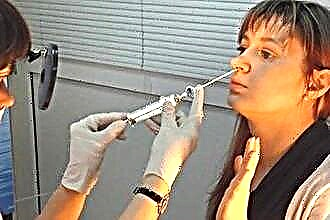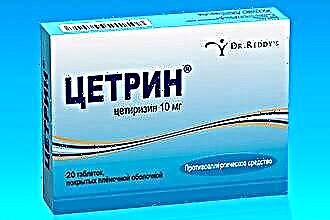Nobody is immune from diseases, including pregnant women. Especially from those transmitted by airborne droplets. You can catch the virus even in the antenatal clinic or on the way to her. And although there is usually nothing dangerous in this, the cough that appears must be cured. This is where the problem arises - many traditional remedies and drugs are blacklisted during this period. Then how can a cough during 1 trimester pregnancy be treated?
Why is coughing dangerous?
 Any cough during pregnancy is undesirable. And not only because it can be a symptom of a cold or a virus. A sharp paroxysmal dry cough during pregnancy can provoke a threat of miscarriage. During an attack, the abdominal muscles are strongly contracted, and tension is transmitted to the walls of the uterus. With such strong and frequent shocks, if the ovum is not yet well fixed, it may die or its partial detachment will occur, which will lead to hypoxia and underdevelopment of the fetus.
Any cough during pregnancy is undesirable. And not only because it can be a symptom of a cold or a virus. A sharp paroxysmal dry cough during pregnancy can provoke a threat of miscarriage. During an attack, the abdominal muscles are strongly contracted, and tension is transmitted to the walls of the uterus. With such strong and frequent shocks, if the ovum is not yet well fixed, it may die or its partial detachment will occur, which will lead to hypoxia and underdevelopment of the fetus.
A wet cough, although usually not as strong, is mainly an indicator that a virus has entered the body. And if untreated, it can penetrate deep into the respiratory tract and cause purulent inflammatory processes, which will have to be treated with the use of antibiotics. And this often leads to abnormalities in the development of the fetus.
We focus on this not in order to intimidate the expectant mother, but to make it clear that any cough during early pregnancy requires compulsory treatment.
What not to do
Since pregnancy is a special period, it imposes a number of restrictions on a woman's lifestyle. This also applies to traditional methods of treatment. Some of them are undesirable and even unacceptable during early pregnancy.
Here's what you shouldn't do under any circumstances:
- Ignore the cough. This is not the case when you can expect everything to go away by itself. Of course, this also happens if a woman has strong immunity. But much more often, if untreated, the cough becomes stronger, the disease deepens and then pharyngitis, tracheitis or bronchitis have to be treated. And this process is much longer and more complicated. Therefore, it is better to avoid complications.
- Take antibiotics. The placental barrier in the first trimester of pregnancy is just being formed and this process will be completed by 3-4 months. Up to this point, everything that enters the mother's blood directly affects the fetus. Most antibacterial drugs are toxic for him and can cause congenital malformations or freezing of pregnancy.
- Warm your feet. One of the most popular and effective folk ways to cure a cold cough is to put mustard plasters on your feet or put mustard powder in your socks. This procedure activates blood circulation, primarily in the legs and pelvic organs. In early pregnancy, this can cause a miscarriage. It is also not recommended to take hot baths and steam feet.
 Essential oils. They are able to penetrate into the deep layers of the skin and have a powerful effect on the body. Therefore, in no case should they be used uncontrollably. Some oils are strongly discouraged during pregnancy: sage, thuja, hyssop, rue, wormwood, and some types of lavender. But there are those that will bring tangible benefits and help you cope with coughs faster.
Essential oils. They are able to penetrate into the deep layers of the skin and have a powerful effect on the body. Therefore, in no case should they be used uncontrollably. Some oils are strongly discouraged during pregnancy: sage, thuja, hyssop, rue, wormwood, and some types of lavender. But there are those that will bring tangible benefits and help you cope with coughs faster.- Electrical procedures. Fall under the ban for the entire "pregnant" period. The list includes electrophoresis, UHF, magnetotherapy, laser heating, etc.
- But these are only the main limitations. In fact, there are many more of them. That is why it is so important from the very first weeks to consult with a gynecologist and register. It is equally important to immediately inform your doctor about your situation if you seek qualified help. Then he will be able to pick up drugs that will not affect the health of the unborn baby in any way.
If you buy medicines on your own, read the instructions carefully. It indicates for each drug whether it can be used during pregnancy and how this may affect its course.
But you should not seek advice on the Internet. Usually they are written by the same young and inexperienced mothers who check everything by trial and error. In this case, the cost of a mistake is health, and sometimes the life of the future baby.
Folk remedies
 In principle, a cough during pregnancy can be cured without strong medications. Moreover, now there are many phyto-pharmacies where you can buy homeopathic remedies and natural herbal preparations. They also need to be taken correctly, since sometimes they are not inferior to traditional medicines in terms of the intensity of their effect on the body.
In principle, a cough during pregnancy can be cured without strong medications. Moreover, now there are many phyto-pharmacies where you can buy homeopathic remedies and natural herbal preparations. They also need to be taken correctly, since sometimes they are not inferior to traditional medicines in terms of the intensity of their effect on the body.
Here are some proven ways to make pregnancy cough treatment effective and safe:
- Tea with raspberry syrup or jam (you can use raspberry leaves) copes with high temperatures just as well as Panadol. It has antiseptic, anti-inflammatory and analgesic properties.
- Warm milk with honey is a classic, proven remedy for centuries. It will allow you to quickly relieve an attack of dry cough, pacify pain and irritation in the throat, and help you fall asleep faster in the evening. For frequent coughing fits, you can use it more than once a day.
- Herbal rinse. Use decoctions of eucalyptus, chamomile, calendula, thyme, elecampane. They have antiseptic, antibacterial and anti-inflammatory properties. Gargle frequently, ideally every two hours.
- Camphor oil. In the absence of individual intolerance, it is an excellent universal cough remedy. It can be used as a rubbing or a compress, and inhaling its vapor at the same time works as an inhalation.
- Lemon water or tea. But be sure to cut the lemon with the peel. It contains valuable essential oils that have a detrimental effect on most pathogenic microorganisms. And the acidic environment is extremely inconvenient for their active reproduction.
Drinking a lot of herbal decoctions is undesirable. Moreover, if these are ready-made mixtures, the properties of all components of which you do not know. Some ingredients can be toxic to the fetus or cause involuntary contractions of the uterus, which can lead to fetal abnormalities or termination of pregnancy.
Inhalation should be used with caution. With a large accumulation of mucus, it can swell under the influence of steam and cause an attack of a severe suffocating cough, the harm of which for a pregnant woman we spoke about at the beginning. If there is no temperature, then you can use mustard plasters or vodka compress for warming up.
Pharmacy preparations
But what about those who are used to trusting only pharmaceutical preparations? Among them, you can also choose the right remedies depending on the type and cause of the cough. The medications listed below are relatively safe. They can treat a cough during pregnancy in the 1st trimester, but it is still better to do it under the supervision of a doctor.
 Antihistamines. Quickly relieve an attack of allergic cough or caused by severe irritation of the larynx. They reduce the amount of mucous secretions, relieve swelling of the mucous membranes, some have a mild sedative effect. Pregnant women are often recommended "Finastil", "Tavegil", "Zirtek".
Antihistamines. Quickly relieve an attack of allergic cough or caused by severe irritation of the larynx. They reduce the amount of mucous secretions, relieve swelling of the mucous membranes, some have a mild sedative effect. Pregnant women are often recommended "Finastil", "Tavegil", "Zirtek".- Immunomodulators. They help the body of a pregnant woman to quickly cope with viruses that have entered the upper respiratory tract. At the same time, they do not have a toxic effect on the fetus.The most effective are "Interferon", "Anaferon", "Cycloferon" and others.
- Antiseptics. If the cough is of a bacterial nature, and it is impossible to act on it with antibiotics, there is nothing left but to use local antiseptic drugs, which are used to treat the throat and oral cavity. These are "Lugol's solution", "Chlorhexidine", "Chlorophyllipt", furacilin solution.
- Cough suppressants. Syrups and potions help to relieve sore throat, soften cough and stop an attack. In liquid form, they are absorbed faster and easier by the body and envelop the mucous membranes, creating a protective layer on them. Plant-based syrups have proven themselves well: Doctor Mom, Herbion, Ambroxol, Bromhexin.
- Antipyretic drugs. At a high temperature (from 38 degrees), it is permissible to take antipyretic drugs "Aspirin", "Panadol", "Paracetamol". But as soon as the fever is removed, they are immediately canceled. Drinking plenty of fluids will complete the business and prevent the temperature from rising again.
Before taking any medications during pregnancy, you must carefully study the instructions and in no case exceed the recommended dosage in it. If in doubt, consult a specialist. As a last resort, this can be done by phone.
Prophylaxis
Taking care of your health is one of the most important tasks of a pregnant woman. Her body is directly connected with the unborn child, therefore, she has to limit herself in everything that can damage his development or the favorable course of pregnancy. Simple preventive measures will help strengthen the immune system and avoid diseases and related complications:
- It is desirable that the pregnancy is planned. Modern contraceptives allow 95-99% to avoid unwanted pregnancy. If you have recently undergone serious broncho-pulmonary diseases, surgery, then it is better to postpone conception for several months until the body is fully restored.
- The use of immunomodulators activates the immune system, which prevents infections and viruses from penetrating deep into the body. They can be drunk a month or a month and a half before the planned pregnancy, and then the disease will be more difficult to "catch" in the body.
 Proper nutrition plays a major role during pregnancy. It provides the body of the mother and fetus with all vital substances that affect, among other things, the state of the immune system. The diet of the expectant mother should contain as many fresh fruits and vegetables as possible. But you should not lean on your favorite citrus fruits - they can provoke a congenital allergy in a child.
Proper nutrition plays a major role during pregnancy. It provides the body of the mother and fetus with all vital substances that affect, among other things, the state of the immune system. The diet of the expectant mother should contain as many fresh fruits and vegetables as possible. But you should not lean on your favorite citrus fruits - they can provoke a congenital allergy in a child.- Pregnancy is not a disease. Therefore, if the process goes on without significant pathologies, one should try to lead an active lifestyle - do morning exercises, move more, walk in the fresh air. Sunlight contributes to the production of vitamin D, which is necessary for both mother and child. And clean air provides them with an additional portion of oxygen.
- Hardening procedures should not be canceled either. But they must be done with more caution. If you haven't bathed in an ice hole before, you shouldn't start right now. But a contrast shower with a moderate temperature difference will not only strengthen the immune system, but also make the skin more elastic, preventing the appearance of stretch marks.
- During the cold season, keep your head and legs warm. This will prevent hypothermia and colds. It is undesirable to be outside for a long time in too damp or windy weather. And if it happens to freeze over, after returning home, you must definitely drink warm tea and lie in bed for an hour.
And most importantly, if you are already sick, you do not need to self-medicate and experiment with your own health. During pregnancy, you are responsible for two lives at once.
Therefore, if a cough suddenly appeared and in a couple of days you have not overcome it with harmless home methods, consult your doctor. This will help avoid complications and long-term treatment.

 Essential oils. They are able to penetrate into the deep layers of the skin and have a powerful effect on the body. Therefore, in no case should they be used uncontrollably. Some oils are strongly discouraged during pregnancy: sage, thuja, hyssop, rue, wormwood, and some types of lavender. But there are those that will bring tangible benefits and help you cope with coughs faster.
Essential oils. They are able to penetrate into the deep layers of the skin and have a powerful effect on the body. Therefore, in no case should they be used uncontrollably. Some oils are strongly discouraged during pregnancy: sage, thuja, hyssop, rue, wormwood, and some types of lavender. But there are those that will bring tangible benefits and help you cope with coughs faster. Antihistamines. Quickly relieve an attack of allergic cough or caused by severe irritation of the larynx. They reduce the amount of mucous secretions, relieve swelling of the mucous membranes, some have a mild sedative effect. Pregnant women are often recommended "Finastil", "Tavegil", "Zirtek".
Antihistamines. Quickly relieve an attack of allergic cough or caused by severe irritation of the larynx. They reduce the amount of mucous secretions, relieve swelling of the mucous membranes, some have a mild sedative effect. Pregnant women are often recommended "Finastil", "Tavegil", "Zirtek". Proper nutrition plays a major role during pregnancy. It provides the body of the mother and fetus with all vital substances that affect, among other things, the state of the immune system. The diet of the expectant mother should contain as many fresh fruits and vegetables as possible. But you should not lean on your favorite citrus fruits - they can provoke a congenital allergy in a child.
Proper nutrition plays a major role during pregnancy. It provides the body of the mother and fetus with all vital substances that affect, among other things, the state of the immune system. The diet of the expectant mother should contain as many fresh fruits and vegetables as possible. But you should not lean on your favorite citrus fruits - they can provoke a congenital allergy in a child.

